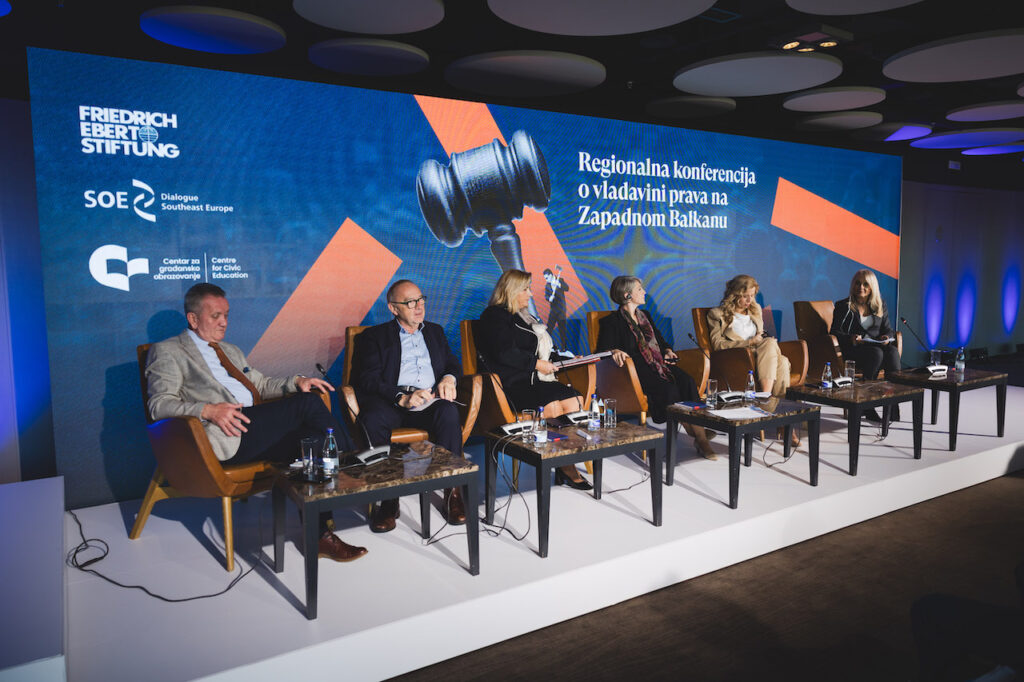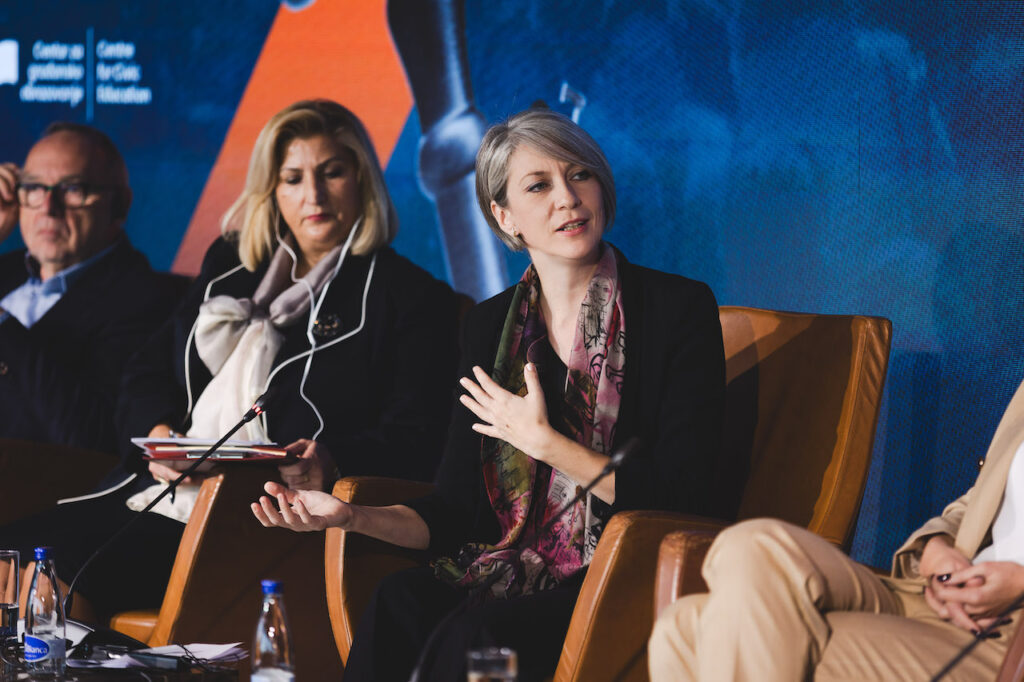Cooperation among Western Balkan countries in combating crime and corruption is essential, with bilateral agreements needed to facilitate information exchange, according to statements made at the regional rule of law conference for the Western Balkans organized by the Centre for Civic Education (CCE) and the German Friedrich Ebert Stiftung (FES).
Liaison Prosecutor for North Macedonia at EUROJUST, Lenche Ristoska, spoke on the panel “Combating Corruption and Organized Crime: A Judicial Perspective,” where she noted that the judiciary in North Macedonia faces a severe crisis of integrity and identity, questioning whether the judiciary serves the elite or the citizens.
“Skepticism among citizens has eroded trust in the judicial system. Low public confidence in the judiciary points to a deep crisis, not arising by accident but as a result of pervasive corruption. Citizens only have the illusion that the system exists to protect their rights,” said Ristoska.
She added that the foundations of justice have been shaken, raising doubts about whether justice can be served. “Things have deteriorated, and the trend suggests it will get worse, as the perception of substantial political influence on the judiciary grows,” Ristoska stated.
She highlighted recent controversial statements in North Macedonia indicating political influence on the judiciary and noted that statute limitations have been an issue in many cases. “A culture of impunity prevails, with the elite sending the message that this is acceptable,” Ristoska observed.
For further progress, she emphasized the need to strengthen investigative capacities, which has already begun. While noting that North Macedonia’s legal framework is substantially aligned with EU standards, she stressed the need for further judicial reform.
“We must strengthen the independence of judicial bodies and reform the Criminal Code and the Code of Criminal Procedure,” Ristoska explained.
Mechanisms to strengthen judicial integrity must also be found. “Judicial independence needs reinforcement. Our judiciary depends on the executive branch, and this must change,” Ristoska stated.
Her vision is a judiciary that guarantees the fight against organized crime. “To achieve this, we must continue reforms, which also requires better regional cooperation,” Ristoska concluded.
Bojana Savović, Prosecutor at the Higher Public Prosecutor’s Office in Belgrade, recounted the media harassment she faced due to her anti-corruption work, noting the lack of support from the international community for those facing such attacks.
“They declare their support, but when tabloids label you as a foreign agent, they don’t stand by you. Fighting tabloids requires institutional backing. People may not take tabloids seriously, but they deeply affect my life and my family’s. Prosecutors are trained to fight crime, but not to be dragged through tabloids,” Savović explained.
She also said that those who have integrity suffer consequences within the system itself and that everything they do is looked at through a magnifying glass, assessing that this kind of pressure some do not want to suffer. She also pointed to the narrative of identifying the government with the state, given that it is a common accusation that critics are accusing of overthrowing the state.
Kosovo’s Special Prosecutor, Shenaj Berisha, remarked that fighting crime is the Western Balkans’ greatest challenge, but also a prerequisite for building a democratic society.
“Corruption is present in Kosovo, from the lowest civil servant positions to the highest government offices; this is nothing new,” said Berisha.
She noted that Kosovo’s legal system is significantly aligned with European standards. “However, we don’t have the same mindset as the EU; there are ongoing attempts to influence the judiciary and prosecution. Combating corruption is a major challenge, and the judiciary has a crucial responsibility to prosecute and penalize those who abuse the system,” Berisha added.
Berisha also raised the issue of information from investigations sometimes leaking to the media, which as she believes negatively impacts the course of investigations.
She highlighted that the consequences of criminal activity can disrupt public order and society. “Cooperation among Western Balkan countries is essential, with bilateral agreements needed to facilitate information exchange. Crime knows no borders, and combating it is challenging; a situation mirrored globally,” concluded Berisha.
Vlado Adamović, a lawyer from Bosnia and Herzegovina, argued that it’s time for change.
“We need to start discussing the distinction between society and the state. The state is losing relevance; sovereignty no longer truly exists, as there is a ‘grey hand’ at play, which is becoming increasingly visible in society. We are reaching a point where we are supporting failing societies,” said Adamović, comparing this with more organized societies which have functional institutional frameworks.
Former Minister of Finance of North Rhine-Westphalia, Norbert Walter-Borjans, observed that the discussion revealed only minor differences in issues faced across the region, also noting that Western democracy is in crisis. “The elite has taken control of politics, not just here but also in Germany, where this trend is on the rise,” Walter Borjans said.
In Germany, he noted, analyses show that citizens have less influence on politics, which signals the need for a stronger civil sector, especially in the context of rising right-wing extremism.
Corruption is a structural problem that must be continually addressed, Walter Borjans noted. “In all countries with rule of law, the laws are sound, but the problem lies in their enforcement,” he added.
Reflecting on his professional experience, particularly in tackling tax evasion, he highlighted the importance of data exchange between institutions. “When I was a minister, I improved inter-agency cooperation. Although I am no longer in office, this practice has continued, which pleases me because we share a democratic foundation that ensures the system’s sustainability,” Walter-Borjans concluded.
Agency MINA



